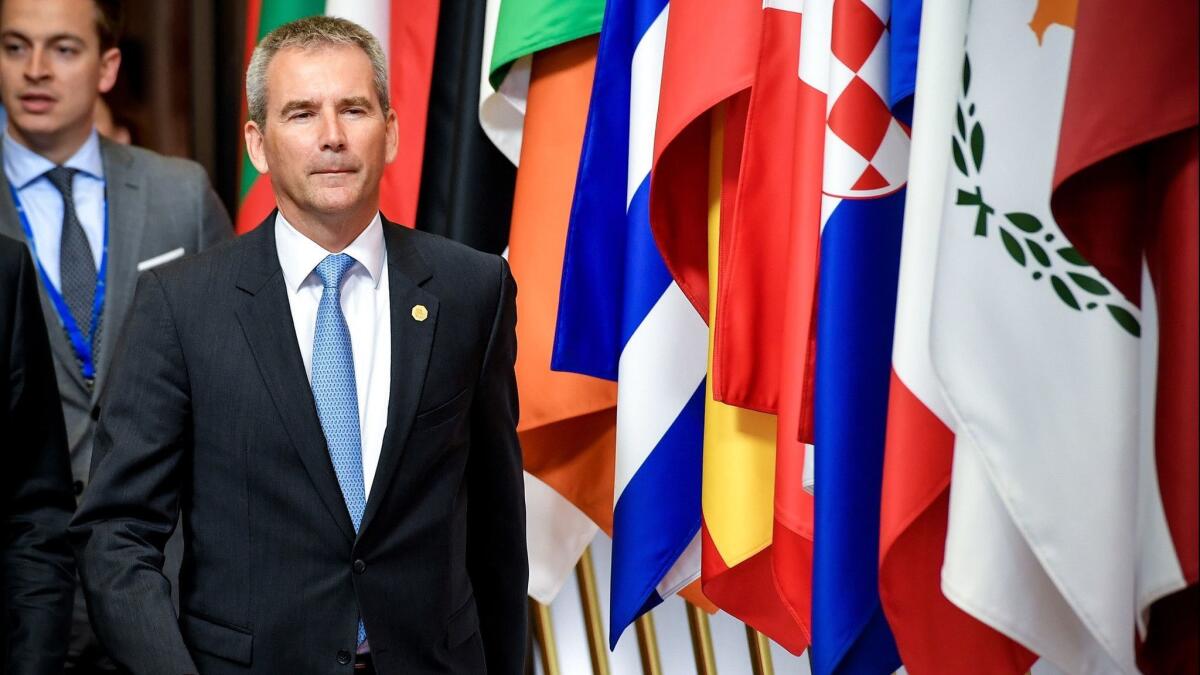Editorial: EU elections exposed the erosion of Europe’s political middle

- Share via
The results of the just concluded European Union parliamentary elections weren’t as bad as supporters of the postwar order of liberal democracies had feared they would be. But they weren’t good, either. The nationalist right improved its position slightly, and the Greens and other left-leaning parties did better than anticipated. But the real news — and the real concern — is the continuing erosion of the political middle, and the strong showing by nationalists in Italy and France. The takeaway? Support for European solidarity, and even the very notion of a European Union, continues to fragment.
The pressures are considerable. Immigration, there as here, galvanized nationalists to continue their troubling repudiations of diversity and tolerance. And there are no easy solutions to the flow of hundreds of thousands of migrants from Middle East and North African war zones, and from political and economic instability — some of it climate-driven — in sub-Saharan Africa. That influx has exposed European fractures and played a significant role in persuading German Chancellor Angela Merkel, whose Christian Democratic Union party was trounced in regional elections last fall, to not seek reelection. It fueled Brexit, the British vote to leave the European Union — a process that has foundered so badly that now Prime Minister THeresa May is resigning and the Tories are fighting for the soul of the Conservative Party. It has helped propel nationalists to powerful positions in Italy, Hungary and Austria. Anti-Semitism also is on the rise, which we can only hope is a hiccup and not an echo of a dark and horrific past.
Of course, this struggle between inward-focusing nationalism and globalization-embracing liberalism isn’t just a European phenomenon, and the battle is being fought on many fronts at the same time. Donald Trump exploited that rift to win the White House. Scandal-weary Brazil elected far-right populist Jair Bolsonaro in October. Philippine President Rodrigo Duterte solidified power in legislative elections earlier this month despite — or perhaps because of — extrajudicial killings of suspected drug dealers and addicts that have drawn international condemnations. Prime Minister Narendra Modi and his Hindu nationalists were just overwhelmingly reelected in India.
Enter the Fray: First takes on the news of the minute »
Unfortunately, this broad disillusionment with an interconnected world comes against the backdrop of a rising China, which promotes a self-serving vision of globalism, and an aggressively meddlesome Russia, which is determined to reassert itself as a power. Trump’s withdrawal of the U.S. as a leader on the international stage has left a vacuum and uncertainty about the future of international engagement.
Nationalism helped propel Europe into two devastating wars in the 20th century, and while the current situation does not indicate that we are heading down that road again, the world will face better prospects for peace, mutual prosperity and respect for fundamental human rights through cooperation and interconnections. As countries focus more on what they believe makes their populations unique, they risk obscuring the commonalities of humankind that we must rely on to confront an ever-changing world — and one that is careening toward existential crisis from global warming, a shared problem that will require a shared solution.
The EU election results also show us what happens when leaders of government fail to lead. France’s Yellow Vests movement is born of similar conditions to the United States’ tea party movement: a sense that national leaders and dominant multinational corporations have failed to recognize globalization’s impacts on small towns and rural areas suffering moribund local economies and stubborn unemployment, and the stress that places on local cultures and standards of living. Growing income inequality reinforces the notion that governments place the interests of wealth over all others.
European voters have delivered yet another wake-up call to the governing classes of the EU nations, and of our own. There are crosscurrents and divergent wants within those nations, but a common sentiment is that people are not happy with the way they’re being governed. They want change, but often can’t define exactly what that change should be, or even whether it’s forward-looking or a return to an often-romanticized sense of a better past.
Nevertheless, one thing is rock-solid sure: The future cannot be forged by authoritarian regimes led by unaccountable strongmen in defiance of international norms of decency and democratic institutions. This closing off of ourselves from one another, this ostracizing of migrants or minority populations within our own nations, is not a recipe for success. If we devolve further into disunity and fail to forge our way back to compromise and common ground, we will find progress to be elusive on nearly all fronts.
Follow the Opinion section on Twitter @latimesopinion or Facebook.
More to Read
A cure for the common opinion
Get thought-provoking perspectives with our weekly newsletter.
You may occasionally receive promotional content from the Los Angeles Times.









